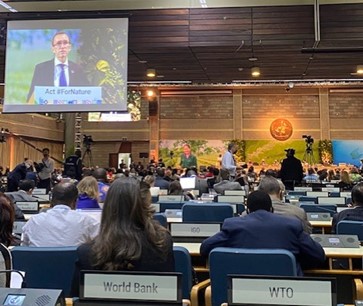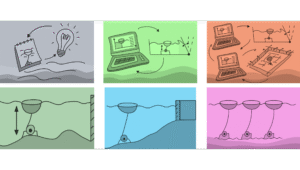The words echoed in the negotiation room this week at UNEA5.2 as the UNEA president, Espen Barth Eide opened the conference. Our oceans are drowning in plastic and in need of a globally binding agreement to successfully mitigate the crisis. Over the past 10 years we have produced more plastic than in the whole of the previous century. This problem is growing, and it has become clear that beach and oceans clean-ups will not cut it. If we want to truly ‘beat’ plastics we must understand our production, consumption, and disposal on land. This is exactly what has been taking place on the grounds at the United Nations Environmental Assembly (UNEA). It is time to turn off the tap on plastic waste and set clear and legally binding ambitions to curb the problem.
Last week, UN member states met at the UNEP headquarters in Nairobi to form the text for what such a treaty mandate must include. After long hours of deliberation from the delegates, key issues emerged and halted negotiations from moving faster. One of the key issues was some countries’ will to focus on marine pollution rather than a full life cycle approach, as well as lack of consensus on making the treaty legally binding – which could mean fines for noncompliance. What is clear, is that since the resolution moved forward at the start of the UNEA conference, the world will see the most comprehensive treaty on plastics ever. A treaty that will hold nations accountable for their creation, use, and disposal of plastics.
SINTEF Ocean has been on the grounds of the UNEA conference in Nairobi this week. We have used event ethnography as a methodology to assess narratives and actions around how different actors come together at the international negotiation arena of UNEA5.2. Our goal is to understand and disseminate paradigm shifts in the global environmental politics of curbing plastic pollution. The treaty itself can take years to negotiate, but many member states have set their sights on 2024. Our team will continue to follow the treaty throughout its creation and into when it becomes a conference of parties (COP).

Moments ago, in the closing segment of UNEA5 on March 2nd UN member states officially adopted the text to start negotiations on a landmark plastics treaty. The treaty is expected to be the biggest global agreement for the environment since Paris. The treaty will address the full lifecycle of plastics, from production, consumption, and management. This could mean that before the end of the decade consumers might find fewer plastic products, more return schemes, and global action to reduce our environmental footprint. Our political and social science team at SINTEF will be following the treaty throughout its negotiations in the next years and are passionate to re-invent and re-imagine our relationship with this long-lasting product that is plastic.








Comments
No comments yet. Be the first to comment!